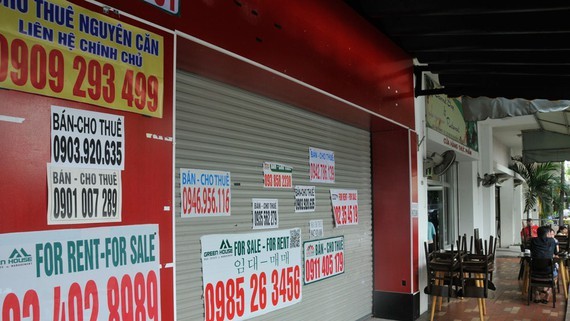
The report on the retail market in the first quarter of this year by CBRE Vietnam showed that retail sales of catering and accommodation services decreased by 9.6 percent and 27.8 percent respectively compared to the same period last year. Footfall in shopping centers started to decrease from February and by the end of March, losing approximately 70 – 80 percent. Declines in revenue varied across different sectors. Education recorded almost no revenue. Meanwhile, food and beverage, fashion and accessories, or entertainment saw a decrease from 50 percent to 80 percent in revenue. In shopping centers, some tenants had to temporarily close their stores but they have not terminated lease contracts because of supportive measures of landlords. After the directive on the suspension of unnecessary activities, landlords announced that they would temporarily close their shopping centers until April 15. In Ho Chi Minh City, most shopping centers applied an average rental rebate of 10-30 percent for various sectors since mid-March and a few since February this year, and up to 50 percent rent reduction for forced closed sectors. By the end of the first quarter of this year, the rental rate for the ground floor and the first floor in central business district (CBD) fell by 11.4 percent compared to the previous quarter and that in non-CBD sank 15.9 percent compared to last quarter. The decrease was higher for the upper floors. In comparison with the same period last year, the rental rate in CBD slid 6.6 percent and that in non-CBD plunged 17.6 percent. The occupancy rate remained stable compared to the previous quarter as some tenants temporarily closed but have not terminated lease contracts. The Covid-19 pandemic also caused the entrance and expansion of new brands to slow down in the first quarter. In the first three months of this year, in Ho Chi Minh City, there were only two new tenants, consisting of Daniel Wellington and Edelkochen, at Crescent Mall in District 7. These two brands had made opening plans since last year and already prepared so they could not cancel their plans. Future projects that are under construction or leasing showed signs of delay. According to statistics by market research companies, in the first quarter of this year, Ho Chi Minh City did not receive any new projects, the supply maintained at the level of 1.05 million square meters of net leasable area at the end of last year. If the disease cannot be controlled in the second quarter of this year, the new supply of this year might be equal to 20 percent of the forecast of 152,000 square meters last year. Some completed and for-lease projects might be forced to postpone the opening date. In Hanoi, in March, many landlords have started to provide rental rebates and promote activities to boost consumption. Rental rebates of 20-30 percent have been introduced in some projects and are likely to extend to the second quarter. In the first quarter, although the asking rent has not been adjusted in accordance with the actual rent in the CBD, according to observation, it declined by 6.6 percent quarterly; while the non-CBD suffered stronger impacts, slumping 18.1 percent. According to the leader of CBRE-Hanoi Branch, trental rebates applied from April onwards following the Government’s forced closure decision can put further downward pressure on the rental rate of Hanoi’s retail market. Impacts are expected to be greater on non-CBD projects, while rent in the CBD will be affected at a slighter degree. The entrance and expansion of some luxury brands in Hanoi had contributed to a lower vacancy rate recorded in the CBD, reaching 0.7 percent, 0.6 percentage points lower compared to the previous quarter. Meanwhile, with a fairly high supply in 2019, newly-operated projects were still in the progress of achieving a stable occupancy rate. The average vacancy rate in non-CBD was at 8.5 percent, 0.2 percentage points lower than the previous quarter. Market research companies also introduced various scenarios for the retail sector next year. Of which, in the worst scenario, in which if the Covid-19 pandemic lasts until September this year, retail landlords will continue to have to face several difficulties. In the future, newly-built shopping centers will encounter many challenges in finding tenants as tenants are cautious and almost make no expansion plans.
The difficulty of the retail market makes it difficult for retail stores, but it is an opportunity for online selling to soar. A survey by Nielsen Company in February this year showed that spending on essential items like dried food, health care, and cleaning products increased by an average of 35-70 percent. Online retailers such as Tiki and SpeedLotte ... recorded an average increase of at least 2-4 times in a day. Co.opmart's online shopping service increased 4-5 times in the same period. Tiki also recorded a record high of nearly 4,000 orders per minute during peak hours. Grab also quickly launched the Grabmart service.
























